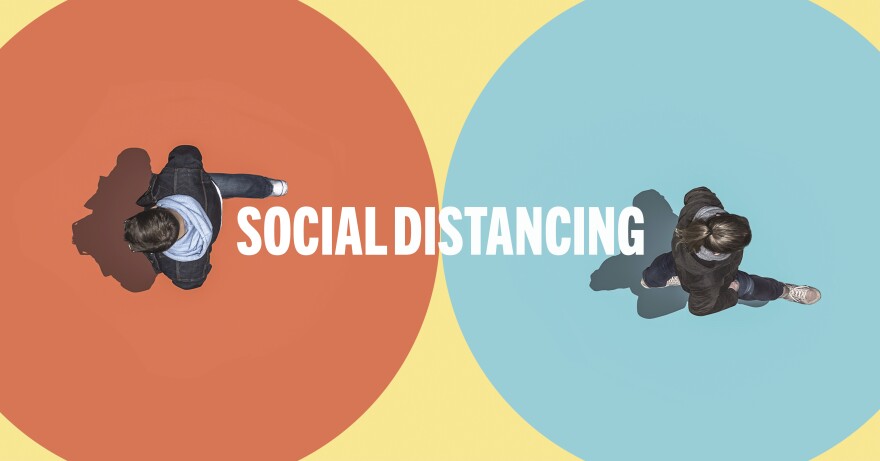Since the outbreak of the coronavirus, all of our lives have changed in some way. Maybe that means you’re working from home for the first time or having to put off a major life event like a wedding or funeral.
It might mean you’re out of work, taking an unexpected financial hit … or juggling work while having your kids at home.
In our new series Social Distancing, WFAE’s Sarah Delia speaks with you, our listeners about the challenges you’re facing. WFAE is trying to do its best to work remotely, so the majority of this series, including the interviews, are being done from Delia's dining room table.
In our second installment, she spoke to a Davidson woman waiting for a surgery that will hopefully reunite her with her family.
All eyes are watching the continuing spread of the coronavirus. And how could they not be? There’s so many unknowns right now -- from the shortages of masks for health care workers to the number of available hospital beds for the sick.
But what if you need medical attention outside of the coronavirus pandemic? What then?
That’s what 53-year-old Babi Alarcon of Davidson is wondering.
Alarcon's family has been living in France for about two years. And a few weeks ago -- which feels like a different lifetime at this point -- she injured her leg during a family skiing trip to Austria. She had a work trip to the United States already planned and figured she’d get her leg checked out while she was home in North Carolina.
At that time, things were different. She figured she would come home to Davidson, treat her leg, and then reunite with her husband and daughter in France.
She got back to the United States, and set up in the guest house behind her home, which is currently being rented out. An MRI revealed she had a fracture, not a tear, and she would need surgery.
The day of her surgery, she got a call. She says she had been cleared by her surgeon, but the anesthesiologist team wasn’t comfortable being in the operation room until she had been quarantined a full 14 days, which she was shy of. So she asked if she could be tested to ease any fears she had contracted the coronavirus.
"They said they could not test me because I didn’t have symptoms and I didn’t qualify for a test," she said. "It was sort of 'damned if you do, damned if you don’t.' I wasn’t sick enough to get the test but I was apparently at risk for not being back 14 days."
Alarcon understands there is a shortage of tests and realizes the concerns of health care workers. At the same time, she’s in pain. And this surgery is not an elective one.
"I have a piece of tibia that is about an inch away from where it should be," she said.
Quick anatomy lesson -- the tibia is commonly known as the shinbone. The longer she waits to get the surgery, the longer she risks further injuring herself. The hardest part is being away from her family and not knowing when they’ll be reunited.
"Being separated from my husband and daughter ... and also my parents. My mother is one of those people if I have a toothache, she will fly and see me," Alarcon said. "And they live in Ecuador which is on complete lockdown right now."
Alarcon is practicing social distancing. She’s limited to puzzles, reading, and FaceTiming. She can’t go for walks because of her injury. She’s isolated and doesn’t know when she won’t be.
But here’s where Alarcon is really lucky. She lives on one those special streets that seem hard to come by these days. Her street is a little ecosystem of neighbors who not only know each other, but care and check in.
"When one of our neighbors has a baby we take turns bringing meals, if someone is sick or anyone is in need, the street rallies, " she said.
One of the ways the French have rallied around each other while still practicing social distancing, is through nightly cheers. She told her Davidson neighbors about them.
"At 8 p.m., everybody opens their windows and cheers," she said. "It’s a cheer for the health care workers, a 'you’re not alone' cheer. My daughter yesterday blasted 'Staying Alive' from the Bee Gees out her window (in France). So people do whatever and it’s a way every night for people to feel connected."
So her neighbors had an idea. What if they organized a similar cheer for the street, so everyone would feel a little less alone?
"Friday, I hobbled down," she said. "Everyone walked down to our respective driveway, and we were within 10 feet apart, everyone brought their own drink (and) we had a cheer. It was human contact, it was safe, it was wonderful."
It was the rallying cry of a street in Davidson that connected everyone if just for a moment, in world that feels more isolating every day.
At the time of this call, there were many unknowns for Alarcon -- when would she have her surgery? What will her recovery be like? And when will she be reunited with her family? But there was one thing that was certain -- with a street like hers, she’s far from alone.
WFAE wants to hear from you. If you’d like to share your story on the new challenges you’re facing in the wake of the coronavirus outbreak, give us a call and leave a voicemail. The number is 704-916-9114. Or go wfae.org for more information. Follow WFAE for the latest news. And we hope you and your loved ones are taking care.
Click here for the latest coronavirus news on WFAE’s live blog.
Sign up here for The Frequency, WFAE’s daily email newsletter.
What questions do you have about the coronavirus? What has this experience been like for you? Share your questions below.
_




